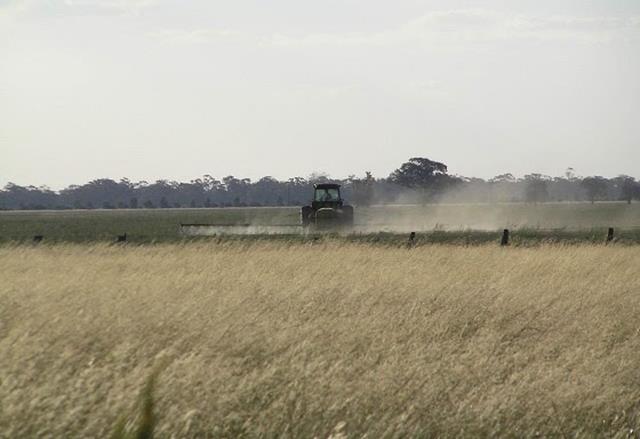With the wet spring, and ongoing cooler conditions heading into summer, producers are being reminded to consider not only their immediate neighbours but the potential for spray drift damage well away from their property when planning spraying operations in coming weeks.
With last season’s wet summer leading to spray drift impacts, the Department of Primary Industries and Regions (PIRSA) is once again emphasising the need for
producers to ensure they are following label directions, best practice advice and closely monitoring weather conditions.
Climatic conditions over recent months across the state’s agricultural areas have been favourable for weed and fungal disease establishment, making it highly likely that producers will need to undertake chemical control during the course of this summer.
Without proper consideration and planning, chemical spraying comes with significant risks, particularly in regard to spray drift which can impact sensitive neighbouring crops, environments and even rural communities.
General Manager, Plant and Food Standards at the Department of Primary Industries and Regions of PIRSA Dr Ross Meffin said with the amount of spraying likely to take place over summer, absolute diligence will be required round planning and applying.
“Given the potential for spray drift impacts to occur quite some distance away from the original spray application site, spray applicators cannot afford to overlook spray drift risks, no matter how far they are from a sensitive crop or neighbouring town,” she said.
“Even now with improved information and resources available including new weather station technology and the implementation of larger droplet size requirements on labels, chemical users still need to pay attention to the details of their spray activities including having the right chemical required for the job and being up to date on potential weather conditions.
“It is of critical importance that no spraying should take place under hazardous inversion weather conditions which generally exist from late in the evenings, right through the night until early morning.
“If a hazardous inversion is present or likely to occur, then the advice is ‘do not spray’.”
Grain Producers SA Chief Executive Brad Perry said that while chemical application standards and practices have significantly improved in recent years and are followed by the majority of growers, it only takes the actions of a minority of poor operators to not only cause significant damage, but to also threaten major markets with residue detections from spray drift.
“Fortunately, there are now many resources to assist growers in their planning, including the Mesonet weather station grid in the Mid North, Mallee and Riverland, designed to identify potential weather inversions in their area.
“It is also important for growers to adhere to the industry endorsed Code of Practice for Summer Weed Control and we are also encouraging communities of growers to work together through the ‘Keep your droplets to yourself’ campaign to further minimise spray drift risks.”
In investigating reports of spray drift, PIRSA will pursue any instances of deliberate or negligent use of chemicals in contravention of label instructions. Offences carry a maximum penalty of $35,000 per offence, reflecting the seriousness of not following mandatory label instructions. PIRSA will also be proactive with auditing to identify any poor spraying practices this season.
Grain Producers SA is also boosting awareness of spray drift issues through its ‘Keep your droplets to yourself’ campaign, a proactive program designed to both educate and warn growers of the critical need to maintain best practice with their spraying operations. Details are available at grainproducerssa.com.au/gpsas-new-spray-campaign-keep-your-droplets-to-yourself
To assist growers with spray operation planning, information on best practice chemical use, including the industry endorsed Code of Practice for Summer Weed Control, is available at pir.sa.gov.au/chemical-best-practice
If you suspect incidents of spray drift in your neighbourhood or that sprayers may not be carrying out applications to the legal requirements, you are encouraged to report to the Agricultural and Veterinary Chemicals Hotline on 1300 799 684. Reports can be made anonymously. PIRSA will act on any such reporting.
For information on the current Australian Pesticides and Veterinary Medicines Authority (APVMA) 2,4-D requirements visit apvma.gov.au








